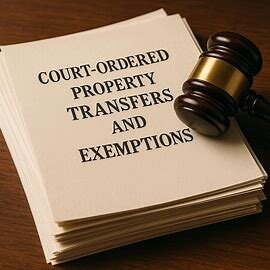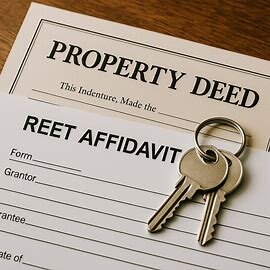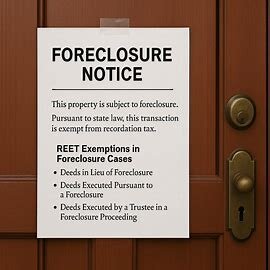Washington State Excise Tax Explained: REI Branded Home Buyer’s Complete Guide

Disclaimer: REI Branded Home Buyer provides educational information only and does not act as a law firm or tax advisory service. For legal or tax advice regarding your situation, please consult with a licensed professional.
When selling a property in Washington, many homeowners are surprised by the real estate excise tax (REET). While sellers usually plan for real estate commissions and standard closing costs, REET often feels like a hidden expense because of its complexity and the large dollar amount it can add to a sale. At REI Branded Home Buyer, we work directly with Washington homeowners to simplify this process and help them avoid costly mistakes.
This cornerstone guide will break down everything you need to know about excise taxes in Washington. In this first section, we’ll cover what excise tax means, its history, and the difference between excise tax and property tax so you understand why it matters in every real estate transaction.

What Is an Excise Tax?
An excise tax is a government-imposed fee on certain goods, services, or transactions. Unlike income tax, which is based on what you earn, or property tax, which is based on assessed value, excise tax applies only when a taxable transaction occurs. That’s why Washington homeowners encounter REET at the time of sale or transfer of real estate.
Washington relies heavily on excise taxes to fund public services because the state does not have a personal income tax. Excise taxes support everything from healthcare and schools to road construction and local infrastructure projects.
Common types of excise taxes in Washington include:
- Sales and use taxes on retail purchases
- Taxes on alcohol, fuel, tobacco, and marijuana
- Business & Occupation (B&O) tax on business income
- And most importantly for homeowners Real Estate Excise Tax (REET)
A Brief History of Excise Taxes in Washington
Excise taxes have long been a cornerstone of Washington’s tax system. Since the state does not collect personal income tax, transaction-based taxes make up a significant portion of state revenue. The Real Estate Excise Tax was first enacted in the early 1980s as part of the Revenue Act to ensure that real estate sales contributed fairly to state and local budgets.
Key milestones in REET’s history include:
- 1983: REET was officially implemented as a state-level tax on property transfers.
- 1990s: Local jurisdictions were granted authority to impose their own transfer taxes in addition to the state REET.
- 2020: The flat statewide REET was replaced with a graduated tax rate, ensuring higher-value properties pay proportionally more.
- 2023: Washington updated the tax brackets again to reflect current property values and keep revenue balanced across different regions of the state.
Today, REET generates hundreds of millions of dollars annually, funding essential services like schools, healthcare, and transportation improvements. It’s one of the most significant transaction-based taxes in Washington’s entire revenue system.
Excise Tax vs. Property Tax: What’s the Difference?
Homeowners often confuse excise tax with property tax, but they serve very different purposes. Understanding the distinction is important when budgeting for a home sale in Washington:
| Excise Tax (REET) | Property Tax |
|---|---|
| Paid only when property is sold or transferred | Paid annually based on the county’s assessed value |
| Calculated as a percentage of the sale price | Calculated using the county’s assessed market value |
| Seller is typically responsible (buyer may be liable if unpaid) | Owner is responsible while holding the property |
| Funds state and local programs like schools, healthcare, and infrastructure | Funds local services such as fire departments, police, and libraries |
Think of property tax as the cost of owning a home in Washington, while excise tax (REET) is the cost of selling one. Both are unavoidable but serve very different purposes in the state’s financial structure.
In the next section of this guide, we’ll dive deeper into the specific types of excise taxes Washington collects, before zeroing in on REET, how it’s calculated, and who is responsible for paying it.
Types of Excise Taxes in Washington State
Washington State uses excise taxes to generate billions in revenue each year. Since there’s no state income tax, excise taxes are one of the primary ways Washington funds essential services. From road repairs to public schools, these taxes directly impact daily life for residents. For homeowners and sellers, understanding these taxes is critical, especially when preparing for a real estate transaction.
Below, we’ll break down the most important types of excise taxes in Washington, with a detailed focus on the Real Estate Excise Tax (REET).
1. Sales Tax
The most familiar excise tax is the sales tax. Washington applies a 6.5% statewide rate on most retail purchases, including furniture, appliances, clothing, and electronics. Local cities and counties can add additional rates on top of the state minimum. In some areas, the total sales tax can exceed 10%.
Exemptions include essential items like groceries and prescription medications. Still, nearly every consumer in Washington pays sales tax regularly, making it the most widely applied excise tax.
2. Use Tax
Use tax complements sales tax. It applies when an item is purchased outside Washington and then brought into the state for use. For example, if you buy furniture in Oregon (which doesn’t have sales tax) and bring it back to Washington, you’re required to pay use tax on that purchase.
This system prevents businesses or consumers from bypassing Washington’s tax system by shopping elsewhere. It ensures fair competition between local and out-of-state retailers.
3. Business & Occupation (B&O) Tax
The B&O tax is unique to Washington and is imposed on the gross receipts of businesses operating within the state. Unlike income tax, B&O doesn’t allow deductions for expenses meaning businesses pay based on their total revenue, not their net profit.
The B&O tax rate varies by classification, such as:
- Retailing
- Wholesaling
- Manufacturing
- Professional services
For entrepreneurs, this tax structure can be challenging, but it is a core part of Washington’s excise tax system.
4. Excise Taxes on Fuel, Tobacco, Liquor, and Marijuana
Washington also collects excise taxes on specific goods with public health or regulatory implications, including:
- Fuel Tax: Paid at the pump and used to maintain state highways and roads.
- Tobacco Tax: Applied to cigarettes, cigars, and smokeless tobacco products.
- Liquor Tax: Applied to beer, wine, and spirits. Washington has one of the highest liquor taxes in the nation.
- Marijuana Tax: Recreational cannabis is taxed heavily, with much of the revenue going toward health programs, education, and substance abuse prevention.
These excise taxes serve both as revenue sources and as deterrents against overuse or abuse of regulated products.
5. Real Estate Excise Tax (REET)
Perhaps the most significant excise tax for property owners is the Real Estate Excise Tax (REET). This tax is levied whenever property in Washington is sold or when a controlling interest in a property changes hands. It is usually the seller’s responsibility, but if the seller fails to pay, the buyer may be held liable.
REET is calculated based on the selling price of the property, not the county’s assessed value. The tax rate is graduated, meaning the percentage owed increases with higher-value sales. Agricultural and timberland are exceptions, taxed at a flat rate of 1.28%.
For example:
- A $400,000 home sale = $4,400 in REET (1.1% rate)
- A $1,200,000 home sale = $15,360 in REET (1.28% rate)
- A $2,000,000 home sale = $55,000 in REET (2.75% rate)
- A $3,500,000 home sale = $105,000 in REET (3.0% rate)
This demonstrates how quickly REET costs can climb, especially for sellers of higher-end properties in markets like Seattle, Bellevue, or Mercer Island.

Why REET Matters to Washington Homeowners
Unlike property tax, which homeowners pay annually, REET is a one-time charge due at the time of sale. It can significantly reduce the net proceeds a seller walks away with at closing. This is why it’s so important for homeowners to account for REET before listing their property.
At REI Branded Home Buyer, we work with sellers across Washington who need fast, predictable closings. By purchasing properties directly, we help homeowners avoid confusion and stress around excise tax payments while still ensuring compliance with state law.
In the next section, we’ll dive deeper into the mechanics of REET covering how it’s calculated, who pays it, and how the money is distributed across Washington State.
How to Calculate Washington State Real Estate Excise Tax (REET)
One of the most important steps when preparing to sell your home in Washington is understanding how much you’ll owe in real estate excise tax. Because the tax is based on your property’s selling price rather than the county’s assessed value, it’s essential to run accurate calculations before closing. This ensures there are no surprises when you sign your final documents.
Graduated REET Rates (as of January 1, 2023)
Washington applies a graduated rate system for REET, meaning the percentage owed increases as the property’s sale price rises. Here are the current thresholds and rates:
| Selling Price | Tax Rate |
|---|---|
| Less than or equal to $525,000 | 1.1% |
| Greater than $525,000 and less than or equal to $1,525,000 | 1.28% |
| Greater than $1,525,000 and less than or equal to $3,025,000 | 2.75% |
| Greater than $3,025,000 | 3.0% |
Special Rule: Agricultural and timberland properties are taxed at a flat 1.28%, regardless of value.

Step-by-Step Guide to Calculating REET
If you’re selling your home, here’s a simple process to estimate your REET obligation:
- Determine Your Selling Price: This is the total amount listed on the purchase and sale agreement, not the assessed value. If you haven’t set a price, consider hiring an appraiser or consulting with a real estate agent.
- Check the Rate Brackets: Find the bracket your selling price falls into based on the table above.
- Apply the Correct Percentage: Multiply your selling price by the corresponding rate to calculate your REET.
- Add Local REET (if applicable): Some cities and counties impose their own transfer taxes. These are added on top of the state REET amount.
- Total Your Costs: Combine the state REET and any local REET to determine your full liability at closing.
Example Calculations
To see how this works in practice, let’s run through some scenarios:
- Example 1: Spokane Home Sale at $400,000
Rate: 1.1% → $400,000 × 0.011 = $4,400 in REET - Example 2: Everett Home Sale at $1,200,000
Rate: 1.28% → $1,200,000 × 0.0128 = $15,360 in REET - Example 3: Seattle Home Sale at $2,000,000
Rate: 2.75% → $2,000,000 × 0.0275 = $55,000 in REET - Example 4: Bellevue Luxury Home Sale at $3,500,000
Rate: 3.0% → $3,500,000 × 0.03 = $105,000 in REET
As you can see, the tax grows steeply as property values increase, especially in high-demand markets like King County.
Special Rules for Mixed-Use and Multi-Parcel Properties
If a property includes multiple parcels or mixed uses (such as residential and agricultural land combined), the calculation becomes more complex. Washington uses a “predominant use” test to determine whether the flat 1.28% rate applies for agricultural/timberland or whether the graduated rates apply.
To determine predominant use:
- Divide the square footage of classified land by the total square footage.
- Divide the county-assessed value of classified land by the total assessed value of all land in the sale.
- Add the results of steps 1 and 2, then divide by two.
If the final result is 0.5 or higher, the property qualifies as agricultural/timberland and is taxed at the flat 1.28% rate. Otherwise, the graduated REET rates apply.
Using the State’s REET Calculator
To simplify the process, the Washington Department of Revenue provides an official REET calculator. By entering your selling price and property type, you can get an estimate of what you’ll owe before closing.
Keep in mind that the calculator only reflects the state portion of REET. Any local transfer taxes imposed by your city or county treasurer will be calculated separately and added to the total.
Why Sellers Should Calculate REET Early
Many homeowners wait until the closing process to think about excise tax, but this can cause financial stress or derail negotiations. By calculating REET early, you can:
- Budget accurately and set your asking price with tax liability in mind.
- Avoid last-minute surprises at closing.
- Negotiate more confidently with buyers by understanding net proceeds.
At REI Branded Home Buyer, we guide Washington homeowners through every step of this process. Whether you’re selling a starter home or a luxury property, we help you understand your true bottom line before signing any paperwork.
In the next section, we’ll cover exemptions and special circumstances cases where sellers may not have to pay REET at all. This is one of the most overlooked parts of the law, and understanding exemptions could save thousands of dollars.

Exemptions and Special Circumstances in Washington State REET
Not every property transfer in Washington is subject to the Real Estate Excise Tax (REET). The state recognizes that certain situations such as family transfers, inheritances, or nonprofit housing projects should not be treated the same way as traditional property sales. These transactions may qualify for exemptions, saving sellers thousands of dollars.
However, exemptions are not automatic. Each claim must be backed by proper documentation, and in some cases, the Department of Revenue may audit the transaction up to four years after the transfer. Below, we’ll explore the most common REET exemptions in detail.
1. Transfers by Gift
If you give property to another person as a gift, no money changes hands and no REET is owed. To qualify, the transfer must be documented as a true gift and not disguised as a sale. Typically, the deed will state that the transfer is “for love and affection” or “without consideration.”
Example: A parent deeds their Spokane home to their child as a gift. Since there is no exchange of money, the transfer is exempt from REET.
2. Inheritance or Death
When property passes through inheritance after someone’s death, REET does not apply. Transfers via a will, trust, or court order are exempt, as long as the transfer is properly documented with probate or estate records.
Example: A sibling inherits their brother’s Tacoma home through a will. Because the transfer is considered an inheritance, no REET is due.
3. Divorce, Separation, or Dissolution of Partnership
Property transfers related to divorce decrees, legal separations, or dissolution of domestic partnerships are exempt. This applies to transfers of community property, court-ordered sales, or transfers between spouses or partners as part of a settlement.
Example: A couple divorces, and one spouse signs over their share of a Seattle condo to the other. This transfer is exempt under state law.
4. Transfers to or from Government Entities
Transactions involving the federal government, state agencies, or local municipalities are typically exempt from REET. This includes eminent domain and condemnation proceedings.
Example: The City of Everett acquires land to expand a public park. Since the transfer is to a government entity, no REET is owed.

5. Bankruptcy, Foreclosure, or Deeds in Lieu
Transfers made in connection with bankruptcy filings, foreclosure proceedings, or deeds in lieu of foreclosure are exempt. These transactions are considered involuntary and do not generate excise tax liability.
Example: A homeowner in Yakima surrenders their house through a deed in lieu of foreclosure. No REET is required because the transfer falls under foreclosure exemption rules.
6. Trust Transfers
Property transfers into or out of certain types of trusts may qualify for exemptions. For example, irrevocable trusts created for estate planning purposes often qualify, while revocable trusts may be treated differently depending on ownership structure.
Example: A family transfers farmland into an irrevocable trust for generational planning. As long as ownership remains within the trust, REET does not apply.
7. 1031 Tax-Deferred Exchanges
Under the federal Internal Revenue Code, 1031 exchanges allow property owners to defer capital gains taxes by reinvesting proceeds into a similar property. Washington recognizes these transactions as exempt from REET, provided they meet IRS requirements.
Example: An investor sells a rental property in Spokane and immediately reinvests the proceeds into a duplex in Wenatchee through a 1031 exchange. This transaction qualifies for exemption.
8. Family Corporations & Partnerships
Transfers within family-owned corporations, LLCs, or partnerships may qualify for exemptions if the transaction represents a “mere change in identity or form of ownership.” In other words, the beneficial ownership stays the same, even though the legal entity changes.
Example: A family transfers ownership of a farm from individual ownership into a family-owned LLC. Since the beneficial owners remain the same, no REET is owed.
9. Low-Income and Affordable Housing Programs
Washington offers exemptions for transactions involving low-income housing, nonprofit organizations, or affordable housing projects. These exemptions are designed to support community development and housing access for underserved populations.
Example: A nonprofit organization in Tacoma acquires property to create affordable housing units. Because the transfer qualifies under the state’s affordable housing provisions, the nonprofit does not pay REET.
10. Other Specialized Exemptions
Additional exemptions may apply in unique cases, such as:
- Rescission of Sale: When a sale is legally reversed and the property reverts to the original owner.
- Condemnation Proceedings: Transfers made under eminent domain.
- IRS Tax-Deferred Transfers: Beyond 1031 exchanges, other tax-deferred scenarios recognized by the IRS may also apply.
- Self-Help Housing: Housing built or improved by low-income families with nonprofit support.
- Transfers for Developmentally Disabled Persons: Housing transfers that directly serve special-needs populations.
Audit and Documentation Requirements
Even if you believe your property transfer qualifies for an exemption, the Washington Department of Revenue may require extensive documentation. In many cases, an audit can occur up to four years after the transaction.
If proper documentation is not provided or if the exemption is denied the seller (or buyer) may be held liable for unpaid REET, plus penalties and interest. For this reason, it is essential to keep detailed records of all exemption-related transfers.
Why Work with Professionals on REET Exemptions
Understanding and proving REET exemptions can be complex. That’s why many homeowners consult with attorneys, tax professionals, or real estate specialists to ensure compliance. At REI Branded Home Buyer, we help sellers explore their options and work with qualified professionals to avoid unnecessary tax liabilities.
In the next section, we’ll cover filing requirements and deadlines including what forms are needed, where to file, and how to avoid penalties for late payment.
Washington State REET Filing Requirements and Deadlines
Once you know how much you’ll owe in Real Estate Excise Tax (REET), the next step is making sure it’s filed and paid correctly. Washington requires sellers (and sometimes buyers) to submit very specific forms, pay the tax at the right office, and meet strict deadlines. Failing to follow these rules can lead to liens, penalties, or even delayed closings.
This section covers exactly what you need to file, where to file, and how to avoid costly mistakes when dealing with REET.
Who Is Responsible for Filing?
In most transactions, the seller is responsible for filing and paying REET. However, Washington law also protects the state’s interests by holding the buyer liable if the seller fails to comply. This means buyers have a vested interest in making sure the tax gets filed on time, especially in high-value transactions.
Real estate agents, escrow officers, and attorneys often assist with REET filings to ensure accuracy, but the legal responsibility still rests with the seller unless otherwise agreed in writing.
What Forms Are Required?
The primary document used for REET filing is the Real Estate Excise Tax Affidavit. This affidavit must be submitted along with the deed (or other transfer document) to the county treasurer’s office.
Depending on the transaction, you may need one of the following:
- State REET Affidavit: Used for most standard real estate sales.
- Controlling Interest Transfer Return: Used when ownership in a corporation, LLC, or partnership shifts by 50% or more.
- Exemption Affidavit: Used when claiming a REET exemption, such as inheritance or divorce-related transfers.
All affidavits must be signed by both the seller and the buyer (or their representatives) and submitted with any required supporting documents.

Where to File REET
Where you file depends on the type of transaction:
- Standard Property Sales: File with the county treasurer where the property is located. The treasurer will process the payment and forward records to the Washington Department of Revenue (DOR).
- Controlling Interest Transfers: File directly with the Washington State Department of Revenue. These must be mailed or electronically submitted to DOR headquarters.
Each county may have slight variations in filing procedures, but all transactions ultimately report back to the state DOR for auditing and enforcement purposes.

When Is REET Due?
By law, REET is due at the time of sale. More specifically, it must be filed and paid on the date the deed or transfer document is delivered to the buyer and notarized. This is considered the legal “date of sale,” even if closing funds are disbursed a few days later.
For controlling interest transfers, the deadline is slightly different: payment must be postmarked within five days of the transfer date. Missing this window can trigger immediate penalties.
Step-by-Step Filing Process
Here’s a simplified guide to filing REET in Washington:
- Prepare the Deed or Transfer Document: Ensure the deed, contract, or ownership transfer document is completed and notarized.
- Complete the REET Affidavit: Fill out the state REET affidavit (or exemption affidavit, if applicable). Be precise with details like sale price, parcel numbers, and parties involved.
- Attach Supporting Documents: If claiming an exemption, provide probate documents, divorce decrees, trust agreements, or IRS exchange paperwork as required.
- Submit to the County Treasurer: File the affidavit, deed, and payment with the county treasurer’s office where the property is located.
- Pay the Tax: Make payment by check, cashier’s check, or money order (some counties allow electronic payments). Include the $5 state technology fee and any local county add-on taxes.
- Get Confirmation: The county treasurer stamps the affidavit as proof of payment. This stamped affidavit must then be recorded with the county auditor along with the deed.
Common Mistakes to Avoid
Even small errors can delay closing or result in rejected filings. Some of the most common mistakes include:
- Incorrect Sale Price: Using the assessed value instead of the actual selling price from the purchase agreement.
- Incomplete Parcel Numbers: Leaving off parcel numbers or legal descriptions of the property.
- Missing Signatures: Both buyer and seller must sign the affidavit; missing signatures will result in rejection.
- Late Filing: Waiting until after the deed is recorded. REET must be filed before or at the same time as the deed.
- Incorrect Exemption Claims: Assuming a transaction qualifies without submitting proper documentation.
Penalties for Missing the Deadline
If REET is not paid on time, penalties add up quickly:
- 5% penalty after 1 month of delinquency
- 10% penalty after 2 months
- 20% penalty after 3 months
In addition, the state charges interest on unpaid balances, and the county may place a lien against the property. This lien must be cleared before the property can be sold again, which can create major headaches for both buyers and sellers.
Professional Help with REET Filing
Because REET filing is detailed and time-sensitive, many sellers choose to work with escrow officers, attorneys, or specialized investors. At REI Branded Home Buyer, we simplify the process by working directly with sellers and ensuring REET filings are handled correctly. Whether you’re facing a traditional sale or a complex exemption case, our team makes sure everything is filed on time and in compliance with Washington law.
Next, we’ll cover the consequences of non-compliance in more detail what happens if REET isn’t paid, how liens work, and the long-term risks of ignoring excise tax obligations.

Consequences of Non-Compliance with Washington State REET
Disclaimer: The following information is provided for educational purposes only. It is not legal or tax advice. Always consult with a qualified Washington State attorney or tax professional for guidance specific to your situation.
Washington State takes the Real Estate Excise Tax (REET) very seriously. Because the tax is tied directly to property transfers, it represents a guaranteed revenue stream for the state and counties. As a result, the Department of Revenue (DOR) enforces strict rules, deadlines, and penalties for non-compliance.
Failing to pay or file correctly can cause significant issues ranging from fines and interest charges to liens that cloud your property’s title. Below, we’ll cover the key consequences sellers (and sometimes buyers) should be aware of.
1. Financial Penalties
If REET is not paid on time, penalties begin to accrue quickly. These penalties are based on the amount of tax owed, and they escalate the longer payment is delayed:
- 5% Penalty: Applied if payment is late by one month.
- 10% Penalty: Applied if payment is late by two months.
- 20% Penalty: Applied if payment is late by three months.
These penalties are in addition to the original tax due, meaning even a small delay can result in hundreds or thousands of dollars in extra charges.
2. Interest Charges
Along with penalties, the state also applies interest on unpaid REET balances. Interest accrues from the date the tax was originally due until it is paid in full. This compounding effect can dramatically increase what you owe if the issue isn’t resolved quickly.
3. Liens Against the Property
If REET is not paid, the county has the authority to place a lien on the property. A lien is a legal claim that stays attached to the property title until the tax debt is satisfied. This creates major problems for both current and future owners:
- The property cannot be sold or refinanced until the lien is cleared.
- Buyers may refuse to complete a transaction if a lien is discovered during title review.
- The lien amount will include tax owed, penalties, interest, and processing fees.
In short, ignoring REET obligations doesn’t just affect the seller it can complicate the property’s ownership history for years to come.
4. Legal Enforcement Actions
In extreme cases of non-payment, Washington State may pursue legal action to collect REET. This could include:
- Collection efforts by the Department of Revenue
- Seizure of funds or property to satisfy outstanding tax debts
- Judgments entered against the seller in court
While rare, these actions highlight the importance of staying compliant with excise tax laws.
5. Additional Fees
Every REET transfer includes certain mandatory fees that sellers should not overlook:
- A $5 state technology fee applies to every transfer.
- If an exemption is claimed, there is also a $5 affidavit processing fee.
- A minimum $10 in fees and/or tax is due on all transfers, even when the calculated REET is very low.
These fees are relatively small compared to the tax itself, but they must still be paid to ensure proper processing of the transaction.
6. Buyer Liability
Although REET is usually the seller’s responsibility, Washington law makes the buyer secondarily liable if the seller fails to pay. This means a buyer could find themselves responsible for unpaid REET even after closing if the seller neglected their obligations.
For this reason, buyers and their agents should always confirm that REET has been properly paid and recorded at closing. Title companies typically check this, but in private sales or unique transfers, it’s especially important to double-check.
Why Compliance Matters
Non-compliance doesn’t just risk financial penalties—it can derail real estate transactions, create legal entanglements, and cause unnecessary stress. For sellers, the safest course of action is to calculate REET early, prepare accurate filings, and submit everything on time.
At REI Branded Home Buyer, we work with Washington homeowners to simplify the selling process. By buying houses directly, we help sellers avoid confusion around REET compliance and ensure transactions are handled smoothly.
Disclaimer: REI Branded Home Buyer is not a law firm or tax advisory service. The information provided here is for educational purposes only. Always consult with a qualified professional before making financial or legal decisions regarding REET.
In the next section, we’ll explain the role of real estate professionals in managing excise tax—and why working with experienced experts can help sellers avoid costly mistakes.
The Role of Real Estate Professionals in Excise Tax Management
Disclaimer: This section is provided for informational purposes only and does not constitute legal or tax advice. For guidance on your specific situation, always consult with a licensed Washington State attorney, CPA, or tax advisor.
For many sellers, filing and paying the Real Estate Excise Tax (REET) can feel overwhelming. Between understanding tax rates, exemptions, deadlines, and forms, it’s easy to make mistakes that lead to penalties or delays. That’s why many Washington homeowners turn to real estate professionals for help navigating the process.
Below, we’ll explore the different professionals who can assist with REET compliance, their roles, and why their involvement can make the transaction smoother and less stressful.
1. Real Estate Agents
Licensed real estate agents in Washington often provide guidance to sellers about REET obligations as part of the closing process. While agents cannot give formal tax or legal advice, they play a key role in ensuring all required documents are in order.
Typical responsibilities include:
- Helping sellers estimate REET costs during listing and pricing discussions
- Coordinating with escrow officers to ensure affidavits are signed and filed
- Explaining deadlines and making sure sellers budget for the tax
Example: A Spokane real estate agent lists a home for $450,000. Knowing the seller will owe $4,950 in REET (1.1%), the agent advises the seller to account for this in their net proceeds calculation. This helps the seller avoid last-minute surprises at closing.
2. Escrow Officers & Title Companies
Escrow officers and title companies are often the ones who physically handle REET filings at closing. Their role is to make sure all funds are collected, affidavits are signed, and the documents are recorded properly with the county treasurer and auditor.
Escrow professionals ensure:
- Funds for REET are collected in escrow and paid directly to the treasurer
- Deeds and affidavits are submitted together to avoid rejection
- Stamped affidavits are recorded correctly to clear title for the buyer
Without escrow’s oversight, many sellers might miss critical steps in the filing process.

3. Attorneys
Real estate attorneys play an essential role in more complex transactions, especially those involving exemptions, trusts, divorces, or estates. Attorneys ensure compliance with Washington statutes and help sellers document exemption claims properly.
Situations where an attorney’s involvement is strongly recommended include:
- Inheritance transfers or probate sales
- Divorce-related property settlements
- 1031 tax-deferred exchanges
- Transfers involving multiple owners or business entities
Example: A Seattle couple divorcing transfers ownership of their home into one spouse’s name. An attorney prepares the necessary exemption affidavit to confirm the transaction is exempt from REET, protecting both parties from unnecessary liability.
4. CPAs & Tax Professionals
Certified Public Accountants (CPAs) and tax professionals help sellers understand the broader tax implications of selling a property, including REET, capital gains, and IRS reporting requirements. While they may not file the affidavit directly, their expertise ensures sellers are prepared financially.
Tax professionals can:
- Advise on whether a transaction qualifies for exemptions
- Help plan timing of sales to minimize overall tax burden
- Coordinate with attorneys and escrow officers for smooth filing
5. Real Estate Investors
For homeowners who want a faster, simpler transaction, selling directly to a real estate investor can eliminate much of the stress around REET. At REI Branded Home Buyer, we purchase houses across Washington for cash, providing a streamlined process that avoids many of the delays of traditional listings.
When working with a direct buyer like us, sellers benefit from:
- A faster closing timeline (often within days, not weeks)
- Simplified paperwork with experienced professionals guiding the process
- Confidence that REET filings will be handled properly at closing
Example: A Tacoma homeowner facing foreclosure sells directly to REI Branded Home Buyer. By closing quickly and coordinating with escrow, the seller avoids additional liens and ensures REET is filed and paid correctly helping them move on without added stress.

Why Professional Help Matters
Even though REET is a standard part of selling property in Washington, the details can be complicated. Professionals provide peace of mind by ensuring taxes are filed accurately and on time. More importantly, they help sellers avoid financial penalties, legal issues, and title complications that arise from mistakes.
For Washington homeowners, the best approach is to plan ahead: calculate REET early, gather the necessary documents, and work with experienced professionals who understand the process inside and out.
In the final section of this guide, we’ll review the key takeaways for navigating REET with confidence—helping sellers make informed decisions and avoid unnecessary headaches.
Key Takeaways: Navigating Washington State REET with Confidence
Understanding Washington State’s Real Estate Excise Tax (REET) is one of the most important steps for anyone preparing to sell a property. Whether you own a single-family home in Spokane, a rental in Tacoma, or a luxury property in Seattle, REET will affect your bottom line at closing. By planning ahead, you can avoid costly surprises and ensure a smooth transfer of ownership.
What We Covered in This Guide
- Excise Tax Basics: Washington doesn’t collect personal income tax, so excise taxes like REET play a central role in funding schools, healthcare, and infrastructure.
- Types of Excise Taxes: From sales tax to fuel tax, Washington collects multiple excise taxes. For homeowners, the most important is REET.
- Calculating REET: The tax is based on your selling price and follows a graduated rate system (1.1% to 3.0%). Agricultural and timberland are taxed at a flat 1.28%.
- Exemptions: Certain transfers including gifts, inheritances, divorces, foreclosures, and nonprofit housing projects—may qualify for exemption if documented properly.
- Filing & Deadlines: Sellers must file a REET affidavit with the county treasurer at the time of sale. Missing deadlines can result in penalties and liens.
- Consequences of Non-Compliance: Penalties escalate from 5% to 20%, and unpaid REET can lead to interest charges, liens, and even legal action.
- Role of Professionals: Agents, attorneys, escrow officers, CPAs, and direct buyers like REI Branded Home Buyer help sellers manage REET filings and avoid mistakes.
Why Compliance Is So Important
Unlike annual property tax, REET is a one-time obligation due at the time of sale. It can reduce your net proceeds by thousands of dollars, especially on higher-value properties. Non-compliance doesn’t just create financial penalties it can also create title issues that impact future buyers and sellers.
By calculating REET early, keeping thorough documentation, and working with experienced professionals, you can avoid these risks and close with confidence.
How REI Branded Home Buyer Can Help
At REI Branded Home Buyer, we work directly with Washington homeowners who need a faster, simpler, and stress-free way to sell. Our process eliminates the guesswork around REET by:
- Buying properties directly for cash, allowing for faster closings
- Working with escrow and title companies to ensure REET is filed correctly
- Helping sellers avoid the stress of last-minute surprises at the closing table
If you’re planning to sell your house in Washington and want clarity around REET, our team can walk you through the process and provide a fair cash offer for your property.
Contact REI Branded Home Buyer today to learn more about how we can simplify your home sale and help you navigate Washington’s real estate excise tax with confidence.

Final Thoughts
Washington’s excise tax system may feel complicated, but with the right preparation and support, it doesn’t have to derail your home sale. By staying informed, planning ahead, and working with trusted professionals, you can protect your bottom line and keep your closing on track.
Disclaimer: REI Branded Home Buyer provides information for educational purposes only. We are not a law firm or tax advisory service. For legal or tax-specific guidance, please seek the advice of a qualified professional in Washington State.

Get a Cash Offer for my Property Today!
Additional Resources To Help Sell Your House In Washington

About REI Branded Home Buyer
Real People. Real Stories. Real Solutions. We’re George and TJ — two regular guys who teamed up to create REI Branded Home Buyer, a local company with one simple mission: to help people sell their homes without stress, games, or pressure. We actually met at a local real estate meetup. A mutual friend randomly shouted, “Hey George, do you want to be this guy’s mentor?” George laughed and said, “Just give him my cell!” A coffee meeting later, and the rest is history. We've been working together ever since. Our passion for helping homeowners comes from personal experience. George was once homeless, so he deeply understands what it’s like to face housing uncertainty. TJ’s family went through a crisis and had to sell their home fast — with the help of a cash homebuyer. Those experiences shaped who we are and inspired us to create a company that treats people the way we wish we’d been treated. Let’s be real: the real estate world is full of shady companies, pushy salespeople, and sleazy homebuyers who care more about profit than people. We started REI Branded Home Buyer because we believe it should be the other way around — people first, profit second. We’re proud to call Spokane home. Our wives, Jenny and Michelle, love the slower pace of life here and all the outdoor beauty Washington has to offer. George and Jenny have two amazing daughters and two dogs — they love to travel and recently visited Japan to see their daughter abroad. TJ and Michelle are outdoor lovers through and through — backpacking, hiking, hunting, fishing, even rock climbing. Michelle’s become quite the mountaineer! If you’re thinking about selling a house — no matter the reason — we’d love to hear your story and see how we can help.
